A system that prioritizes the protection of children's rights, and makes full use of more than 200 questions, to realize a society in which children can live in peace.
Guardian Inc. (※2), presided by Caitlin Erin Puzzar (※1), a criminology graduate from the UK, has started full-scale development of its SOS communication support system “kimino micata” for children and students. Kumamoto City has decided to introduce kimino micata in the Kumamoto City “Child Consultation Project” where a demonstration experiment was conducted, and full-scale development of the project has begun. Based on global standards, kimino micata is an initiative to protect children’s rights and respect their wishes, and its special feature is the effective use of over 200 questions. With the number of abuse, truancy and bullying consultations at a record high (※3), we will contribute to the realization of a society where children can live in peace.
◾️kimino micata, an SOS communication support system for children, as part of the “Child Consultation Project”.
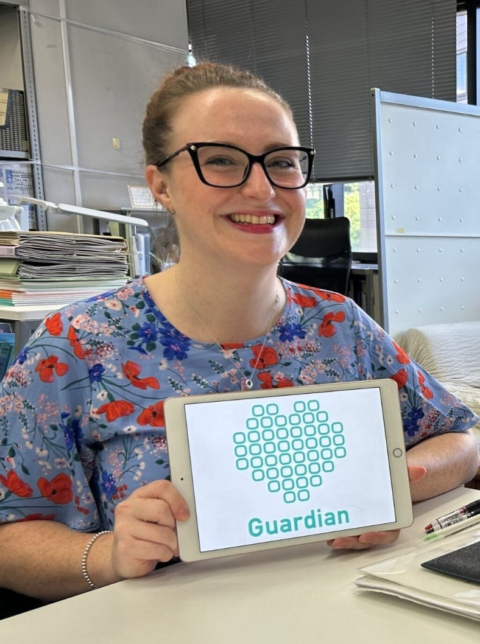
◇Previous safeguarding issue◇
The concept for kimino micata The concept for began when Puzzar, who had been working as an assistant language teacher (ALT) for six years in Kumamoto City, learned about the case of Mia Kurihara in 2019. A situation where questionnaires addressing issues like bullying are placed on teacher’s desks in plain sight is unthinkable in the U.K. Taking into the consideration of the workload of teachers, I thought it was necessary to create an environment where children could answer the questionnaires without feeling anxious (※4).
On the other hand, a survey by the Ministry of Education, Culture, Sports, Science and Technology has shown that questionnaires are the most effective tool for detecting bullying and abuse (※5). Therefore, we began commercializing the service to protect the personal information of children and students, and to disseminate it easily to teachers working to solve problems. Since FY2020, we have been carrying out demonstration tests and trials for implementation in elementary and junior high schools in Kumamoto City.

In recognition of these efforts, the company signed a contract with Kumamoto City on September 1, 2023. The city has decided to collaborate with us in the “Children’s Consultation Project” of Kumamoto City (※6). We have received comments from Kumamoto City officials such as, “It considers the standpoint of the children” (※7). After a period of feedbacks and improvements, the service is now in operation at elementary, junior high, and high schools in Kumamoto City.
Based on our entry into the “Children’s Consultation Project”, we also launched a campaign offering up to three months use free of charge (※9). We will promote the introduction of this service at schools and organizations nationwide from FY2024.
◇Our “children first, three objectives” operation◇
The main features of kimino micata can be summarized into three objectives.
<1> Aiming to create an environment in which people can respond confidently Schools and educational institutions can choose in advance from three survey options: daily, weekly or monthly. Children can respond to the survey using any device with Internet access, including smartphones, tablets, and PCs. the number of questions varies depending on the school grade. For example, the monthly surveys includes: 13 questions for lower elementary school students and 23 questions for high school students. The number of questions can be answered at any time
There are two key points in the implementation. The first is to delegate a “micata team” within the school who can respond to the survey, informing only specific teachers, such as the school nurse or head teacher. For example, if there is something that students do not want the homeroom teacher to know, they can communicate it directly to the “micata team” through the system. The system is designed to protect the child’s human rights. Among other things, the system is designed to raise awareness and obtain the consent of the child in regards to “outing” (which is revealing information to a third party without the consent of the child in question) to protect the child’s human rights.
The second is to have child respond to surveys when they feel comfortable to do so, including after returning home. When they need assistance, there is also a “SOS consult” button that can be clicked anytime. The system is also designed and operated with the child feelings considered first in every aspect (※9).
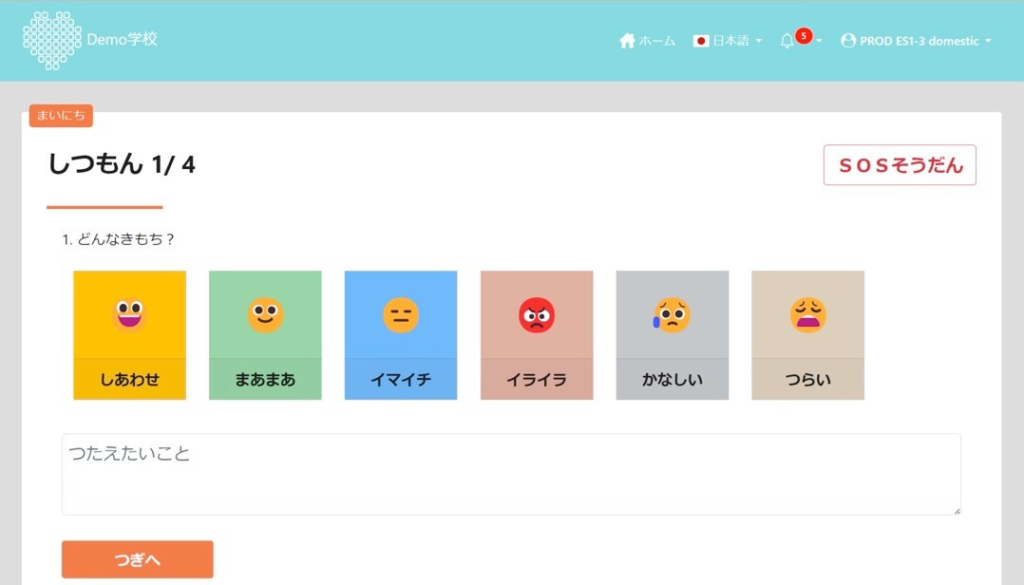
<2> Questionnaire content The questionnaire content, based on expert Japanese and Western psychology standards, as well as questions used in Japanese school questionnaires, covers a range of areas (including bullying, abuse, mental health and neglect). The content was adjusted based on feedback obtained from the demonstration experiments, and with consideration of the Japanese environment. The questions are divided into four levels (lower elementary school, middle and upper elementary school, junior high school, and high school), and address issues closely related to daily life. While mandatory questions include “I want to talk to someone about something ” and “I saw another child being bullied,” the defining feature is asking a different question each time. Questions related to eating are asked from different angles, such as “Do you eat alone?” and “Do you sometimes not want to eat?” (※10). To ensure that children are not bored and do not subconsciously hide anything, we have realized the need for diverse analysis. As of September 1st 2023, the number of prepared questions exceeded 200, will be increased in the future to further improve accuracy.
<3> Aiming for easy use by teachers Children’s responses are automatically collated. The system is set up with an easy-to-understand management screen so that the most urgent responses can be grasped immediately. The system saves teachers the time and effort of tallying questionnaires. Children can send consultation messages at any time, even during the summer holidays, so the system can be used as a tool to detect students issue before the start of the new term, and to enable schools and related institutions to respond early.
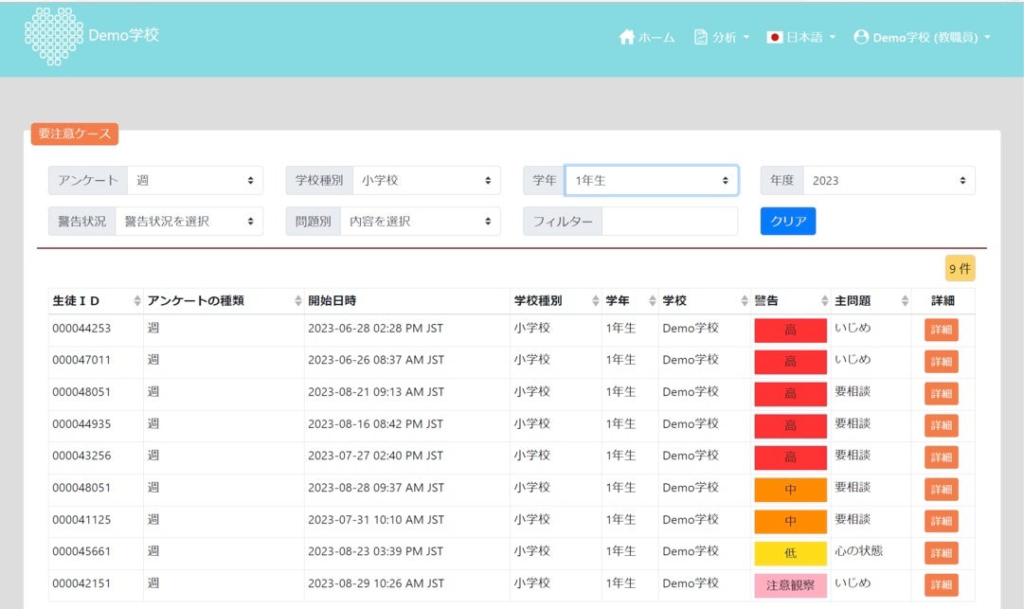
◾️ Costs ◾️(※11) An initial installation environment set-up fee is charged at the time of application, followed by a system usage fee. For schools, the initial set-up fee is 100,000 yen and 100 yen per person per month (both excluding tax). We will set up the system based on the scale and environment; consultation centres can also be linked. Please consult us first.
◾️ Future targets ◾️ Target number of schools to be introduced in the first year (FY2023): 20 schools; (FY2024): 100 schools
◆ Representative director (CEO) Caitlin Erin Puzzar comment◆
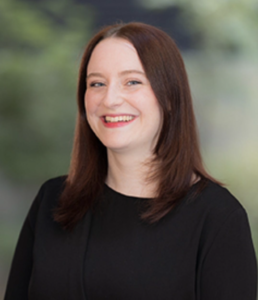
It is hoped that through this project, children will be able to easily access consultation services. The SOS communication support system ‘kimino micata’ is designed with the child as the priority. We believe that if we can clearly identify the needs and requests of children, we can respond to the voices of children who are in desperate need of support. Together with Kumamoto City, we will work hard on this issue and spread the results across the country.
◆ Director, Co-founder (COO) Hiromi Murakami comment ◆
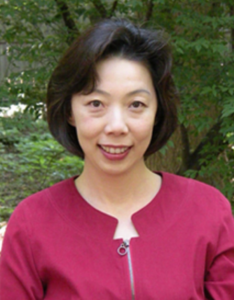
I am developing an entrepreneurship support programme to support young people and women who want to solve social issues, and Caitlin participated in the programme when it was held in Kumamoto in 2019. She discussed the case of Mia Kurihara, then 10, in Chiba Prefecture, who died as a result of abuse by her father. She asked “Why wasn’t anything done?” and took action. Impressed by Caitlin’s enthusiasm, they started a company Murakami started the company as a co-founder. We will contribute to the realization of a society where children can live in peace.
※1) About representative director (CEO) Caitlin Erin Puzzar
Graduated from Keele University, England (BA Criminology & competency in Japanese) in 2016. After graduation, she worked as an assistant language teacher (ALT) at elementary and junior high schools for six years in Kumamoto City. In 2019, the death of Mia Kurihara (then 10 years old) in Chiba Prefecture, Japan, due to abuse by her father, raised the issue of inappropriate handling of school questionnaires. Mia sought help, but the questionnaire was given to her father. I wrote my dissertation on child abuse and exploitation when I was at university, so every time I saw these incidents, I could not help but feel for these children, and I felt very strongly that I wanted to protect them. Since then, I have aspired to develop a child abuse and bullying early detection application, and have participated in business competitions and fundraising.
2019 May – Caitlin won grand prize at the WISE “Energize Kumamoto with ideas” workshop, organized by JSIE and supported by Kumamoto Prefecture.
2020 January – Start of system development
2021 February – First demonstration tests started at elementary and junior high schools in Kumamoto City October – Nominated in the British Chamber of Commerce (BCCJ) British Business Awards 2021 – Diversity Equity and Inclusion
2022 February – Second demonstration tests started at elementary and junior high schools in Kumamoto City. May – Awarded the Smart City Promotion Start-up Support Grant (Kyoto) June – Held first diversity and inclusion workshop (co-hosted by JSIE) October – Nominated in the British Chamber of Commerce (BCCJ) British Business Awards 2022 – Caitlin for Study UK Alumni of the year, system for Diversity Equity and Inclusion November – Caitlin selected as a Cohort 7 member of the Phoenixi Inc. incubation programme December – Guardian Inc. established
2023 February – Child SOS support system name launch – kimino micata July -Accepted into the “2023 Project for solving social issues through start-ups” (Kyoto City/Kyoto Institute of Advanced Technology)
※2)About Guardian Inc. Address – 33-16 Yoshidatachibanacho, Sakyo Ward, Kyoto City, Kyoto Prefecture, Japan 606-8303 Representative director – Caitlin Erin Puzzar Business activities – Educational support, development & provision of IT services, human resources development support, regional revitalization projects, consulting etc. Capital – 5.45 million yen Established – 1st December 2022
※3) Number of cases of consultation responses to abuse, bullying and truancy. Consultation responses increased for 32 consecutive years On 7 September 2023, the Child and Family Agency announced that the number of cases of child abuse consultations received and responded to by child guidance centres nationwide in fiscal 2022 (preliminary figures) was 219,170 (an increase of 5.5% on the previous year). This is the 32nd consecutive year of increase since the statistics began in 1990.
https://www.cfa.go.jp/assets/contents/node/basic_page/field_ref_resources/a176de99-390e-4065-a7fb-fe569ab2450c/12d7a89f/20230401_policies_jidougyakutai_19.pdf The report also stated that in FY2021, 50 children nationwide died as a result of being abused by a parent or other family member, excluding those who died as a result of a heart attack. Approximately one child dies every week. https://www.cfa.go.jp/councils/shingikai/gyakutai_boushi/hogojirei/19-houkoku/
Bullying and truancy are both at record highs. In October 2011, media reports revealed the results of the Ministry of Education, Culture, Sports, Science and Technology’s Survey on Problematic Behaviour and School Absence of Children for the academic year 2022, which showed a record number of approximately 299,000 students who were absent from school for 30 days or more in primary and junior high schools. This was a serious increase of 22.1% from the previous year. Of these, a record number of 114,000 pupils have not consulted specialized institutions inside or outside school. The number of cases of bullying recognized at elementary, junior high and high schools increased by 10.8% to 681,948, with 923 cases of ‘serious incidents’ where the damage was serious. Both of these were the highest numbers ever recorded. The increase in truancy is thought to be due to the fact that children’s living environment has changed due to the long-lasting effects of COVID-19, making it harder for them to build friendships, and that more parents understand their children’s environment and believe that they do not need to force their children to go to school. The increase in bullying is thought to be resulting from club activities and school events, which had been curtailed due to the COVID-19, have been resumed, increasing opportunities for contact, and the understanding of the positive recognition of bullying has spread. In response to these results, the Ministry of Education, Culture, Sports, Science and Technology is reportedly working with the Child and Family Agency to take countermeasures.
※4) Issues related to the current school questionnaire environment
- Personal data is not protected.
- I don’t know what the problem is other than cyberbullying.
- It is difficult to write the truth.
- The content of the questionnaire varies from school to school.
- Teachers are busy and have a lot of work to do.
※5) Results of the 2022 survey on various student guidance issues such as problematic behaviour and truancy of pupils (released on 4 October 2023 by the Ministry of Education, Culture, Sports, Science and Technology – Children’s Division, Elementary and Secondary Education Bureau). (1st) “Discovered through school initiatives such as questionnaires” at 51.4%, (2nd) complaints from the pupil (himself/herself) at 19.2% and (3rd) complaints from the parents of the pupil (himself/herself) concerned at 11.8%, which is far ahead of the second place and below. This shows that the questionnaire is useful.
※6) Reasons for introducing the system. Mr. Toru Susami, Director of the School Education Department of the Kumamoto City Board of Education, pointed out the appeal of kimino micata, noting that children can complete online questionnaires anytime they feel safe, such as after school hours or when they are at home, and that they can send SOS consultations anytime and anywhere. As for the reasons for the official introduction of the system, he pointed out that Puzzar, who knows the field of education, worked hard to make it a tool that children trust and consult with without increasing the burden on teachers, and that she “worked with us to solve the problems” that emerged based on the results of the demonstration tests.
※7) Comments by Kumamoto City officials Director Kenji Kigushi, Kumamoto City Children’s Bureau (second from the right in the photo, left side is Yoshikazu Ikeda, Member of the General Council)
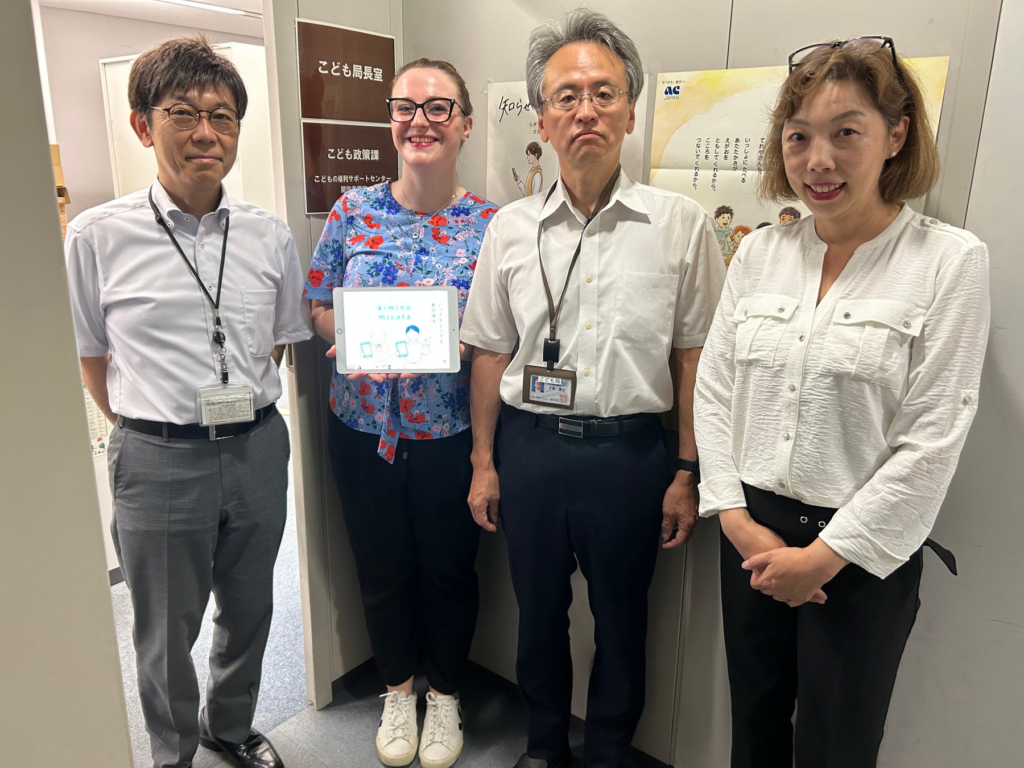
We want to hear children’s voices directly through kimino micata and catch any SOS incidents quickly and accurately. We want to work together to make kimino micata a useful tool.
Kumamoto City Board of Education, School Education Department, Toru Susami (right in photo)
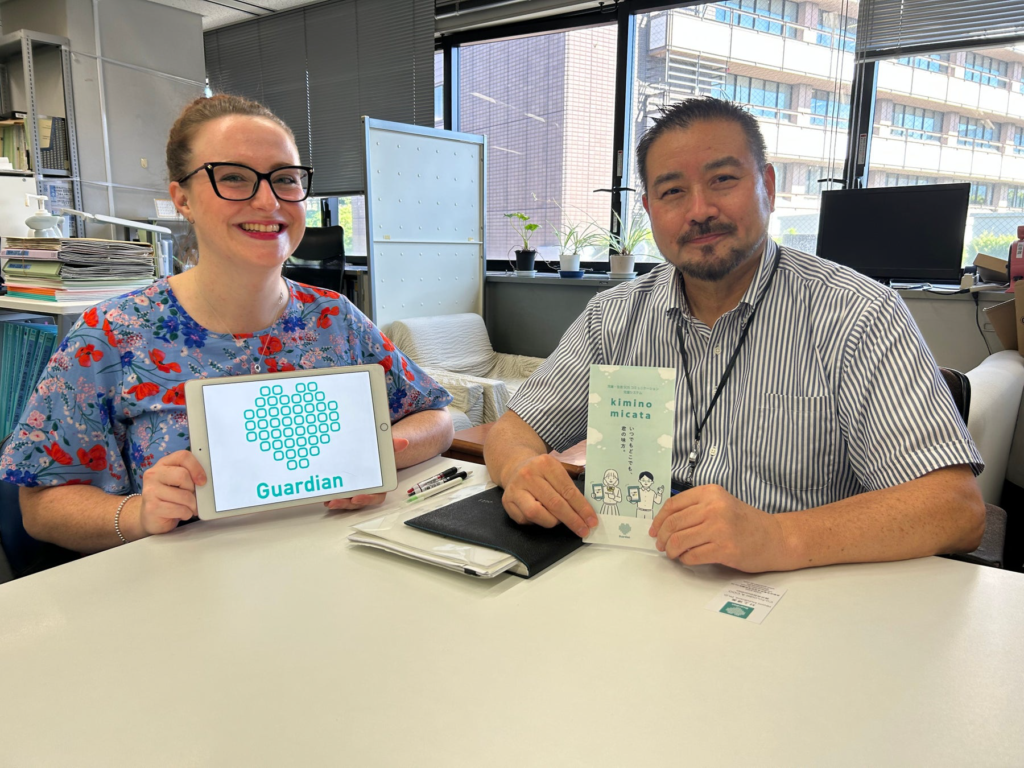
Above all, we want children to feel free to talk to us and we don’t want them to hold back their worries. With kimino micata, we want to create an environment where children feel free to talk to us about their problems at any time. The most important thing is that it is a tool that children can use easily. We have high hopes for kimino micata!
Mr. Daigo Ueno, Director of the Preparation Office of the Children’s Rights Support Centre, Kumamoto City Children’s Bureau (photo: members of the Preparation Office).
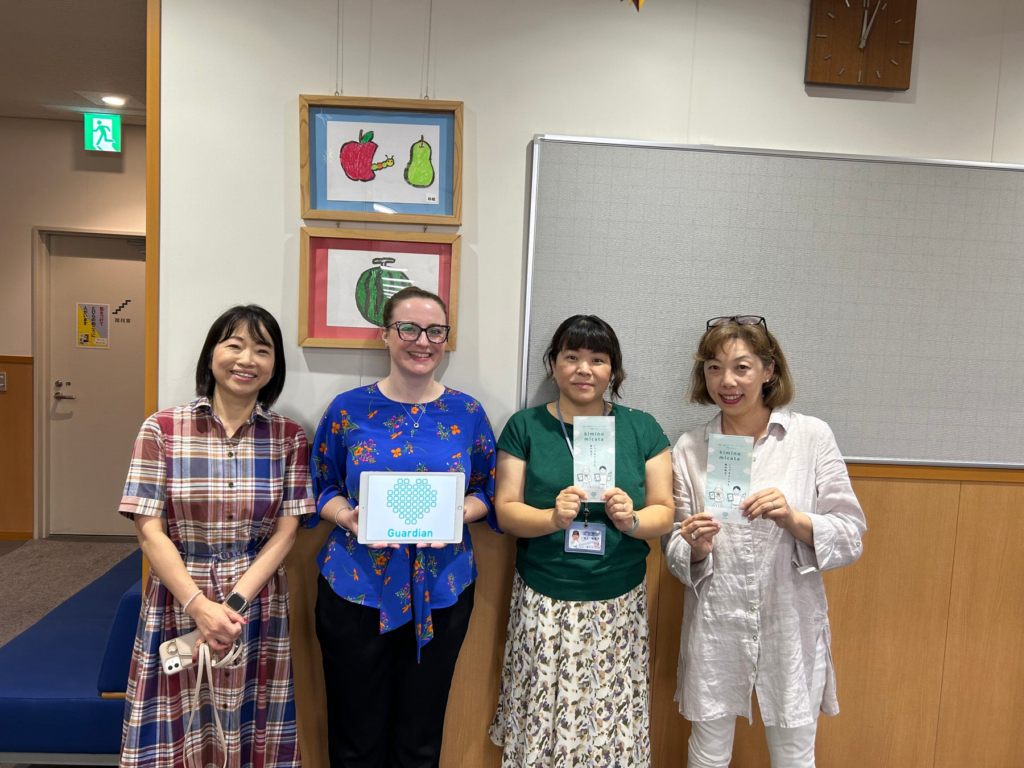
Kimino micata is in line with our policy in that it is a ‘system designed from the child’s point of view’ and that it protects and respects children’s rights. We value children’s confidentiality, and we similarly do not inform schools or families without their consent. We would like to work with kimino micata to ensure that children feel safe and trusted and are able to talk to us about their concerns.
※8) Campaign details [Application period] Autumn 2023 to the end of January 2024. [Campaign benefits] Free system usage fees for up to three months from January to the end of March 2024.[Conditions for application] Annual contract from April 2024 [Costs incurred at the time of application] Initial installation environment. Set-up costs vary depending on the scale and environment. Note: An environmental setup period of approximately one month is required.
※9) Questionnaire system key points (list).
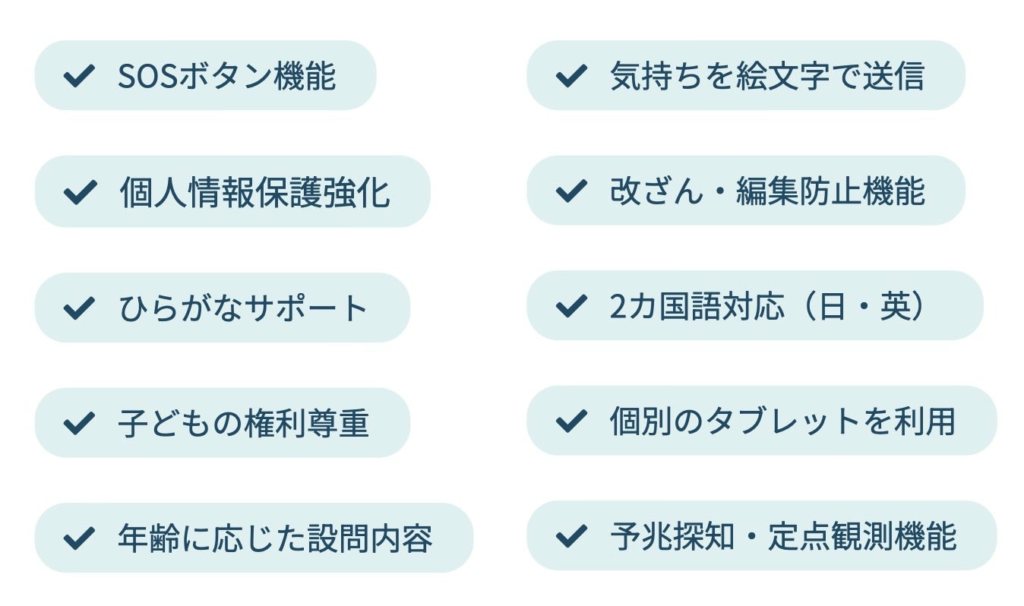
※10)Questionnaire contents Examples of questions about eating.
- Are you eating alone?
- Are you eating dinner at night? (Breakfast is often asked, but we also ask about the evening meal).
- Do you sometimes not want to eat?
- Do they sometimes not feel it tastes good?
Other questions include “Do you know ____?” such as sex education, questions about self-esteem, questions about happiness, etc., while also taking into account the opinions of psychology experts. We try to make it easier for students to communicate content that is difficult for them to say face-to-face, while staying close to their daily lives.
※11)Costs
-Contents performed with the initial installation environment set-up fee Based on the usage environment of each education department/school where the system will be introduced, we will register users and students, set up the type of online questionnaire, provide guidance to teachers on how to use the system and conduct a demonstration. This initial installation fee is incurred only once when you apply for a new contract. Thereafter, there is no charge for ongoing contracts.
-Contents included in the system usage fee and included in the system usage fee. Provision of ‘tutorial videos’ such as manuals and instructions on how to use the system, setting up the environment and regular meetings with the teachers at the school. We will adjust the settings and other aspects of the system according to the situation of the organization or school and create a suitable environment. We also set up a system for sharing information on how to use the system in other schools.
※12)About Director/COO Hiromi Murakami
- Graduated from Sophia University, Faculty of Science and Technology.
- MBA in International Management from St Mary’s University, USA; PhD from Johns Hopkins University School of Advanced International Studies, USA.
- Specialist in international relations, public policy and health policy.
- Academic fellow of the Japan Health Policy Organization. After working as a researcher at the Centre for Global Health, Center for Strategic and International Studies (CSIS), Washington DC, and as a board member of the Japan Health Policy Organization, she is a senior fellow at the Institute for Economic and Strategic Studies.
- She is also an expert in system development and has realized Caitlin’s ideas and co-developed the system.
- She is the President of JSIE (www.jsie.net), a general incorporated association she founded in Washington DC and Tokyo to support young people and women.
Press release list for Guardian Inc.
https://prtimes.jp/main/html/searchrlp/company_id/113718
For media enquiries regarding this matter, please contact: Guardian Inc. Public Relations: Reiko Nagai Telephone: 090-6234-5505 Email: r.nagai@theday-inc.com



